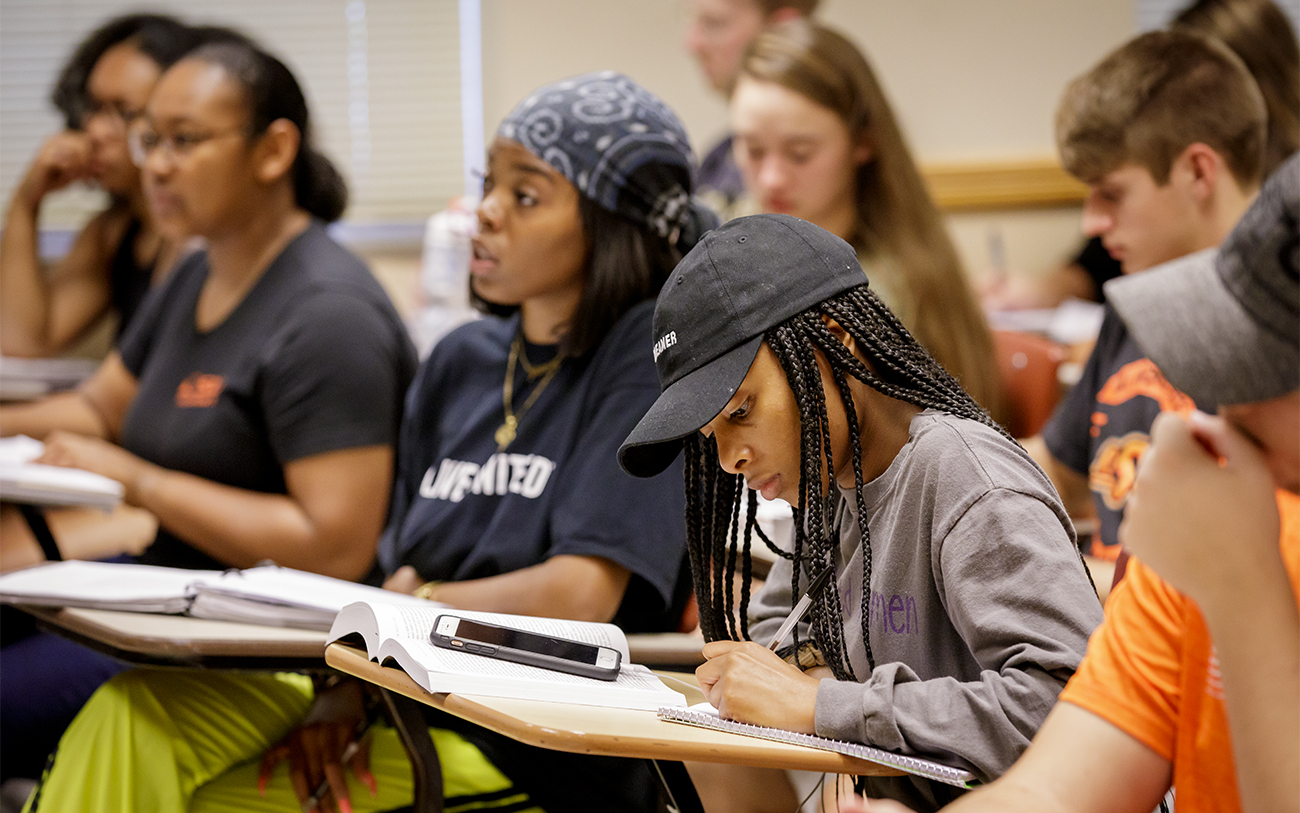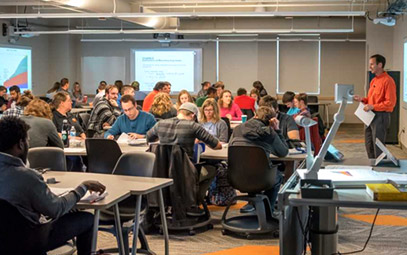Teaching & Learning Support Programs List
Inclusive Teaching
In this workshop series participants will investigate the development of learning environments that are accessible and equitable for all. It is appropriate for instructors who want to deeply consider issues of diversity, equity, and inclusion. It is a semester-long offering; however, much of the work can be done at times convenient to your schedule. Check the ITLE Events page before the beginning of each semester to register.
Upon successful completion, participants will be able to:
- Define and apply an inclusive teaching mindset.
- Consider implicit bias and its potential effect on the learning environment.
- Assess teaching structures shown to support student learning.
- Apply inclusive teaching practices and Universal Design for Learning.
- Cultivate learning environments that are accessible and equitable for all students.
Workshop Structure
This offering is structured as a series of six modules, with each module lasting two weeks. The first week of each module is devoted to learning via readings, videos, and podcasts. The second week of each module is devoted to discussion and application of the module content. There is variety within content and applications making this work directly applicable to the courses you teach.
Schedule
| Name | Description |
|---|---|
| Module 1 |
Defining Inclusive Teaching What is inclusive teaching and why does it matter? |
| Module 2 |
Teaching Humans Are we teaching content or humans (or both!) and how does this point of view shape our teaching? |
| Module 3 |
Examining Implicit Bias How do implicit biases influence the learning environment? |
| Module 4 |
Inclusive Teaching Strategies What does research reveal about inclusive teaching strategies? |
| Module 5 |
Universal Design for Learning How can application of Universal Design for Learning improve teaching and learning? |
| Module 6 |
Fostering an Inclusive Classroom Climate How can we cultivate learning environments that are accessible and equitable for all students? |
Scholarship of Teaching and Learning
This six-week hybrid course focuses on practical, researched-based teaching strategies
for college instructors. Topics for exploration include student motivation and engagement,
educational theory and practice, effective instructional design, active learning techniques,
and assessment.
Each week, participants should expect to devote four to six hours on professional
readings, assignments, and collaborative discussion board conversation. Additionally,
this course requires attendance at two face-to-face sessions. Work in this course
will directly apply to the classes instructors teach, and those successfully completing
the course should expect to gain a comprehensive analysis of instructional strategies
as well as the ability to articulate a professional teaching philosophy.
The two 120-minute face-to-face sessions are listed below.
- Face-to-face Session One: Week one
- Face-to-face Session Two: Week three
Online/Independent work will be in the interim.
Course Design
This collaborative model of professional development offers a framework to aid in designing courses for optimal student learning. Participants have opportunities to discuss and implement strategies through sessions designed to offer flexibility and foster collegial relationships.
This series is especially beneficial for faculty:
- Creating a new course
- Redesigning a current course
- Wanting to apply current teaching and learning research to an existing course
Participants should expect to attend four 90-minute face-to-face sessions and possibly
complete readings or view short instructional videos beyond these face-to-face meeting
times. Sessions are considered true WORKshops with attendees applying ideas to the
courses they teach.
The four 90-minute face-to-face sessions are listed below.
- WORKshop: Planning Your Course: Beginning with the End in Mind
- WORKshop: Student Engagement by Design
- WORKshop: Matching Teaching Methods to Instructional Goals
- WORKshop: Final Collaboration
The examples of reading and video topics are listed below. They vary in time duration,
but typically 10 to 30 minutes per topic.
- Planning for Student Success
- Making Learning Easier
- Increasing Student Proficiency
Effective Teaching
This collaborative cohort model of professional development leverages professors' collective knowledge by bringing together those who wish to focus on effective teaching methods. Group members will have opportunities to consider current research pertaining to effective teaching and discuss application of these strategies in their courses. Sessions are designed to offer flexibility and foster collegial relationships.
This series is especially beneficial for instructors:
- Wanting to learn more about the relationship between teaching and learning
- Desiring to remain current in teaching and learning research
- Hoping to add to their existing teaching repertoire
Participants should expect to attend four 90-minute face-to-face sessions and possibly
complete readings or view short instructional videos beyond these face-to-face meeting
times. Sessions are considered true WORKshops with attendees applying ideas to the
courses they teach.
The four 90-minute face-to-face sessions are listed below.
- WORKshop: Lecture as a Learning Experience
- WORKshop: Case and Problem-Based Learning
- WORKshop: Experiential Learning Strategies
- WORKshop: Synthesizing the Learning
The examples of reading and video topics are listed below. They vary in time duration, but typically 10 to 30 minutes per topic.
- Making Your Lecture a Tool for Learning
- Using Case Studies to Increase Retention
- Experiential Learning Techniques
The Science of Learning
Substantial advances in brain research provide insight into the processes of cognition. Application of this research through subtle shifts in teaching results in greater student learning and retention. Participants have opportunities to discuss current research and its application in the university classroom through sessions designed to offer flexibility and foster collegial relationships.
This series is especially beneficial for faculty interested in:
- Increasing student retention of content
- Varying instructional approaches
- Increasing student engagement within and outside of the classroom
Participants should expect to spend 120 minutes in each of the face-to-face sessions with possible reading material beyond these times. Sessions are considered true WORKshops with attendees applying ideas to the courses they teach. The 120 minutes of face-to-face sessions are listed below.
- WORKshop: Session One: Applying the Science of Learning to Instruction
- WORKshop: Session Two: Considering Brain Research in Course Design
Conducting Meaningful Peer Review
Teaching is a complex endeavor. The best university instructors continually reflect on their practice. participating in a process of peer review is one way for colleagues to support each other as they work toward more effective instructional approaches.
This series is especially beneficial for faculty interested in:
- Examining teaching and learning within a specific course
- Developing as a university instructor
- Participating in a collegial dialogue pertaining to teaching
Participants should expect to attend a total of 120 minutes in face-to-face sessions with possible reading material beyond these times. Sessions are considered true WORKshops with attendees applying ideas to their respective field. The 120 minutes of face-to-face sessions are usually split into the two 60 minute sessions listed below.
- WORKshop: Session One: Building the Foundation for Peer Review
- WORKshop: Session Two: Facilitating the Peer Review Process
Online Teaching
The ITLE Online Teaching Workshop is an intense and engaging two-week summer session in which faculty get a deep dive into several aspects of online learning with the goal of increasing their understanding and knowledge of internet-based courses. As students in this online-only workshop, Participants get firsthand experience for the type of online course environment that is becoming increasingly common on college campuses. There are two required modules that everyone must complete but the other modules offered give Participants a range of choice so they can complete work that is relevant to them, including such topics as:
- Making Your Online Lectures More Effective
- Using Course Maps to Create Effective Online Courses
- Best Practices and Common Pitfalls of Online Education
- Creating an Assignment and Assessment
- Understanding Copyright and Intellectual property
- Technology Tools for Online Educators
- Increasing Student Engagement
- Creating Online Tests
Participants will work independently while also sharing their thoughts and responses on discussion boards, both test-based and video-based, in order to dive deeper into the concepts and topics being explored. One realtime virtual meeting is held at the midpoint of the class to allow Participants an opportunity to engage with each other, discuss specific ideas, and explore the unique challenges of online learning.
Preparing Online Instructors
This six-week course for OSU instructors helps participants learn about and understand principles and best practices of online instruction. Covering a variety of topics such as Student Engagement, Technology Tools, Creating an Online Course Activity, Designing a Syllabus, Investigating Copyright and more, the class is designed to be a hands-on living laboratory in which participants learn from current research as well as each other to discover what works and what doesn't work in quality online instruction.
Preparing Online Instructors gives participants firsthand experience with what it's like to be an online student while also using the online medium to explore different topics each week. The class is fully online except for two meetings, one in the first week and one during the final week, and gives participants the opportunity to utilize technologies like online text and video discussions, virtual meetings, and realtime collaboration tools to work together and complete assignments. At the end of the course each Participant will have a more fully-developed sense of what he or she will need to create quality online instruction in his or her own discipline as well as a sense of what tools, technologies, strategies, and engagement methods he or she would like to utilize.
Participants also generate deliverables that are practical and applicable to their own teaching and professional development including a video reflection in which each participant records his or her own thoughts about several prompts relating to online education. This dynamic and interactive course has benefitted hundreds of instructors and staff over the years and continues to be an essential component to quality online instruction here at Oklahoma State University.








